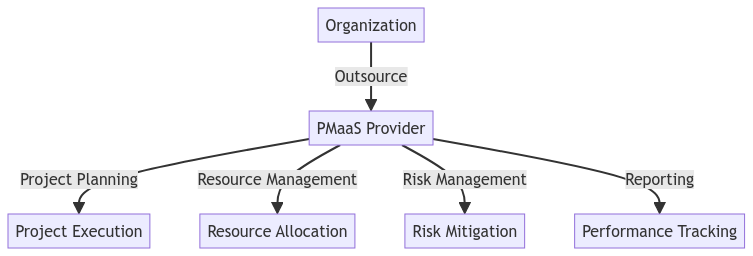The need for flexible, scalable, and efficient project management solutions is more critical than ever. Project Management as a Service (PMaaS) is emerging as the leading model to address these needs, offering organizations a dynamic approach to project delivery that leverages external expertise, technology, and resources. This article explores why PMaaS is the future of project management, its benefits, and how it can transform your business operations.
Understanding Project Management as a Service (PMaaS)
What is PMaaS?
Project Management as a Service (PMaaS) is a model where organizations outsource project management functions to a third-party provider. This service can range from providing experienced project managers to offering comprehensive project management solutions, including planning, execution, monitoring, and control. PMaaS allows companies to access high-level project management expertise without the need for long-term commitments or the overhead of full-time staff.
How PMaaS Works
PMaaS providers deliver tailored solutions based on the specific needs of an organization. This can include project planning, resource management, risk management, and reporting. The service is typically offered on a subscription or pay-per-use basis, allowing for flexibility in scaling resources up or down as needed.

The Benefits of Adopting PMaaS
1. Cost Efficiency
PMaaS offers significant cost savings by reducing the need for full-time project management staff. Organizations can leverage the expertise of seasoned professionals on a project-by-project basis, eliminating overhead costs associated with hiring, training, and retaining in-house staff. This model also allows businesses to convert fixed costs into variable costs, paying only for the services they use.
2. Access to Specialized Expertise
One of the primary advantages of PMaaS is access to specialized expertise. PMaaS providers employ professionals with extensive experience across various industries and project types. This allows organizations to benefit from best practices and innovative solutions that might not be available internally. Whether it’s managing complex IT projects, implementing new technologies, or navigating regulatory compliance, PMaaS providers bring the necessary skills to ensure successful project delivery.
3. Scalability and Flexibility
PMaaS is inherently scalable, making it an ideal solution for organizations with fluctuating project demands. Whether you need support for a single project or a portfolio of initiatives, PMaaS providers can adjust their services to match your needs. This flexibility ensures that you always have the right level of resources at the right time, without the risk of overcommitting or under-resourcing.
4. Faster Time-to-Market
By utilizing the expertise and resources of a PMaaS provider, organizations can accelerate project timelines and reduce time-to-market. PMaaS providers bring established processes, tools, and methodologies that streamline project delivery, allowing for faster execution and more efficient use of resources. This speed is crucial in today’s competitive landscape, where delays can result in lost opportunities and revenue.
5. Risk Mitigation
Risk management is a critical component of successful project delivery. PMaaS providers offer robust risk management frameworks that identify potential risks early and implement strategies to mitigate them. This proactive approach reduces the likelihood of project failure and ensures that projects are completed on time, within scope, and on budget.
Read on: How PMaaS Helps PMOs Achieve Better Project Outcomes
The Future of PMaaS
The Evolution of Project Management
As businesses continue to adapt to rapid technological advancements and shifting market conditions, the demand for flexible and responsive project management solutions will only increase. PMaaS is poised to become the dominant model for project delivery, offering organizations the agility they need to stay competitive. Future trends in PMaaS include increased automation, integration with artificial intelligence, and the use of data analytics to drive decision-making and optimize project outcomes.
Integration with Emerging Technologies
The integration of emerging technologies such as AI, machine learning, and blockchain will further enhance the capabilities of PMaaS providers. AI-driven project management tools can analyze vast amounts of data to predict project outcomes, optimize resource allocation, and identify potential risks. Blockchain technology can provide greater transparency and security in project transactions, ensuring that all stakeholders have access to accurate and immutable records.
Read on: How to Implement Project Management as a Service (PMaaS) into Your Organization
Conclusion
Project Management as a Service (PMaaS) represents a transformative approach to project delivery, offering organizations unparalleled flexibility, access to expertise, and cost efficiency. As the business landscape continues to evolve, PMaaS will play a crucial role in helping organizations navigate complex projects and achieve their strategic goals. Embracing PMaaS today positions your organization for success in the dynamic, fast-paced world of tomorrow.
Ready to transform your project management approach and drive efficiency? Get in touch with us today to discover how our Project Management as a Service (PMaaS) can streamline your operations, reduce costs, and deliver successful outcomes. Let’s start your journey to more effective project management—contact us now to get started!

 monday.com Services
monday.com Services

